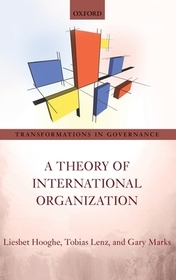
A Theory of International Organization
Sorozatcím: Transformations in Governance;
-
10% KEDVEZMÉNY?
- A kedvezmény csak az 'Értesítés a kedvenc témákról' hírlevelünk címzettjeinek rendeléseire érvényes.
- Kiadói listaár GBP 110.00
-
52 552 Ft (50 050 Ft + 5% áfa)
Az ár azért becsült, mert a rendelés pillanatában nem lehet pontosan tudni, hogy a beérkezéskor milyen lesz a forint árfolyama az adott termék eredeti devizájához képest. Ha a forint romlana, kissé többet, ha javulna, kissé kevesebbet kell majd fizetnie.
- Kedvezmény(ek) 10% (cc. 5 255 Ft off)
- Kedvezményes ár 47 297 Ft (45 045 Ft + 5% áfa)
Iratkozzon fel most és részesüljön kedvezőbb árainkból!
Feliratkozom
52 552 Ft

Beszerezhetőség
Megrendelésre a kiadó utánnyomja a könyvet. Rendelhető, de a szokásosnál kicsit lassabban érkezik meg.
Why don't you give exact delivery time?
A beszerzés időigényét az eddigi tapasztalatokra alapozva adjuk meg. Azért becsült, mert a terméket külföldről hozzuk be, így a kiadó kiszolgálásának pillanatnyi gyorsaságától is függ. A megadottnál gyorsabb és lassabb szállítás is elképzelhető, de mindent megteszünk, hogy Ön a lehető leghamarabb jusson hozzá a termékhez.
A termék adatai:
- Kiadó OUP Oxford
- Megjelenés dátuma 2019. augusztus 29.
- ISBN 9780198766988
- Kötéstípus Keménykötés
- Terjedelem220 oldal
- Méret 242x165x20 mm
- Súly 506 g
- Nyelv angol 30
Kategóriák
Rövid leírás:
International organizations have come to play a central role in world politics. The authors present a major new attempt to explain the difference - and the similarities - between them, as well as their crucial role
TöbbHosszú leírás:
Why do international organizations (IOs) look so different, yet so similar? The possibilities are diverse. Some international organizations have just a few member states, while others span the globe. Some are targeted at a specific problem, while others have policy portfolios as broad as national states. Some are run almost entirely by their member states, while others have independent courts, secretariats, and parliaments. Variation among international organizations appears as wide as that among states. This book explains the design and development of international organization in the postwar period. It theorizes that the basic set up of an IO responds to two forces: the functional impetus to tackle problems that spill beyond national borders and a desire for self-rule that can dampen cooperation where transnational community is thin. The book reveals both the causal power of functionalist pressures and the extent to which nationalism constrains the willingness of member states to engage in incomplete contracting. The implications of postfunctionalist theory for an IO's membership, policy portfolio, contractual specificity, and authoritative competences are tested using annual data for 76 IOs for 1950-2010.
Transformations in Governance is a major academic book series from Oxford University Press. It is designed to accommodate the impressive growth of research in comparative politics, international relations, public policy, federalism, environmental and urban studies concerned with the dispersion of authority from central states up to supranational institutions, down to subnational governments, and side-ways to public-private networks. It brings together work that significantly advances our understanding of the organization, causes, and consequences of multilevel and complex governance. The series is selective, containing annually a small number of books of exceptionally high quality by leading and emerging scholars.
The series targets mainly single-authored or co-authored work, but it is pluralistic in terms of disciplinary specialization, research design, method, and geographical scope. Case studies as well as comparative studies, historical as well as contemporary studies, and studies with a national, regional, or international focus are all central to its aims. Authors use qualitative, quantitative, formal modeling, or mixed methods. A trade mark of the books is that they combine scholarly rigour with readable prose and an attractive production style.
The series is edited by Liesbet Hooghe and Gary Marks of the University of North Carolina, Chapel Hill, and the VU Amsterdam, and Walter Mattli of the University of Oxford.
Hooghe, Lenz and Marks have written a first-rate book that sheds new light on classic questions of authority and institutional design, offers fascinating insights into the way IOs operate and evolve, and presents a range of new puzzles for researchers to explore. It deserves to be widely read.
Tartalomjegyzék:
Introduction
Philosophical Foundations of a Postfunctionalist Theory of International Governance
Measuring International Authority
The Basic Set-Up: How International Organizations Vary
Why do some IOs expand their policy portfolio?
The Resistible Rise of International Authority
Why States Pool Authority
Five Theses on International Governance
Appendix
Part I: Operationalization
Part II: Variables




